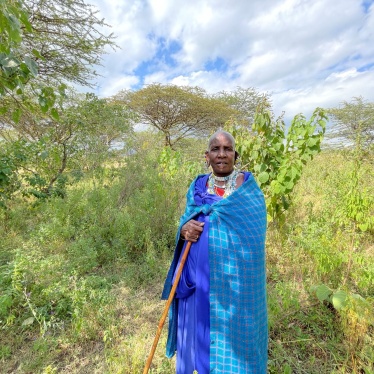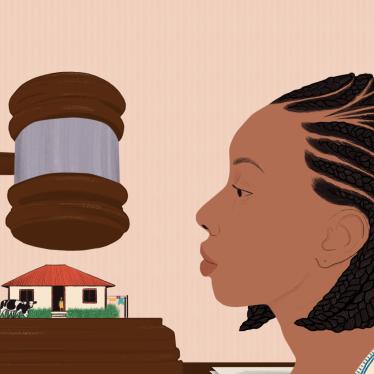(Freetown) – The government of Sierra Leone and a mining company that is the country’s largest private employer have undermined villagers’ access to food and prevented workers from challenging abusive practices, Human Rights Watch said in a report released today. The government should ensure that economic development projects in the booming post conflict nation do not come at the expense of the human rights of local populations.
The 96-page report, “Whose Development?: Human Rights Abuses in Sierra Leone’s Mining Boom,” documents how the government and London-based African Minerals Limited forcibly relocated hundreds of families from verdant slopes to a flat, arid area in Tonkolili District. As a result, residents lost their ability to cultivate crops and engage in income generating activities that once sustained them. Police carried out a bloody crackdown in the town of Bumbuna in April 2012 to quell a protest by workers who went on strike after being barred from forming a union of their own choosing.
“With investors flocking to Sierra Leone, the government has an opportunity to promote development for its desperately poor population,” said Rona Peligal, deputy Africa director at Human Rights Watch and author of the report. “But the African Minerals Limited case shows that, unless the government puts a stop to mining operation abuses, the people who most need to benefit from development will be excluded from it.”
Human Rights Watch interviewed close to 100 people in Sierra Leone for the report, and researched the operations of African Minerals Limited over an 18-month period, beginning in July 2012. Human Rights Watch met with the company’s leadership in February 2013, and corresponded with these directors until their departure from the firm in August. In January 2014, Human Rights Watch wrote to the company’s new management to update findings and request information, but has received no reply.
Sierra Leone is an impoverished West African country still recovering from a catastrophic civil war that ended in 2002. African Minerals Limited, which began mining diamonds in Sierra Leone in 1996, built its Tonkolili mine on what is regarded as one of the largest deposits of magnetite in Africa, a type of iron ore. The company exports the ore to steelmakers in China.
The Sierra Leonean government, while promoting the company’s operations as essential to Sierra Leone’s economic development, permitted corporate actions that violated the rights of Tonkolili’s residents, Human Rights Watch found. For example, the government failed to provide adequate oversight of the company’s consultations with local communities or respond to repeated complaints about the forced relocation of residents. Both the government and the company misled villagers about what would happen once they were moved to the new site.
“The company went to the paramount chief, and the paramount chief told us what to do. We asked so many questions. What they told us they would do, they have not done.… It was a trap,” one village elder told Human Rights Watch. “They said, ‘It will be paradise for you,’ but it’s completely different.”
The government also did not take action in response to apparent African Minerals Limited violations of Sierra Leone labor laws concerning employment, termination, and benefits for its workers. The government’s narrow reading of national labor law as well as political wrangling denied the company’s workers the ability to form a union of their choosing, rather than belong to an established union that the workers regarded as ineffectual.
The government of President Ernest Koroma, re-elected in 2012, is aggressively pursuing an “Agenda for Prosperity,” supported by bilateral donors, the World Bank, the International Monetary Fund (IMF), and corporations attracted by the country’s mineral riches and fertile land. The strategy has yielded high rates of growth; in 2012, Sierra Leone’s economy grew by 21 percent, the fastest in sub-Saharan Africa, according to the IMF.
That growth, however, has not necessarily been matched by improved living conditions for Sierra Leone’s six million people, Human Rights Watch said. The country has ranked as one of the poorest in the world for many years, according to the United Nations Development Programme’s Human Development Index. Corruption and the lack of transparency interfere with Sierra Leone’s progress. The Extractive Industry Transparency Initiative in February 2013 suspended Sierra Leone’s bid for membership after the government failed to sufficiently address discrepancies in recording revenue or payments by companies.
“Is the growth going to foster corruption and sow conflict?” one Sierra Leonean, then working for a development agency, said. “The whole point is to improve the lives of citizens. If that doesn’t happen, then what’s the point?”
Human Rights Watch recommendations to the government include to:
- Provide sufficient resources for the Labor Ministry to oversee and inspect labor conditions throughout the country and allow multiple unions within the same industry;
- Put into effect Sierra Leone’s new law on access to information and publicize all mining contracts;
- Clarify the role of paramount chiefs in questions of land administration and ensure that the pending land law is transparent and equitable; and
- Provide immediate relief to the people who have been forcibly relocated by large-scale land investments, and put in place long-term measures to remedy negative human rights impacts of relocation, particularly concerning access to food, water, and livelihoods.
The government should ensure that state land is allocated transparently and in accordance with the rights of its occupants, and allow residents to obtain accurate information – without fear of reprisal – on the deployment of the country’s resources, Human Rights Watch said.
Sierra Leonean authorities should also meaningfully address longstanding human rights problems such as corruption, opaque governance, unrestrained security forces, lack of clarity in land ownership, and abuses of authority by powerful local chiefs.
“Protecting the rights of all Sierra Leoneans is not an option, but a legal obligation,” Peligal said. “Particularly given Sierra Leone’s history of conflict, promoting rights as part of the country’s sustainable development is essential.”







